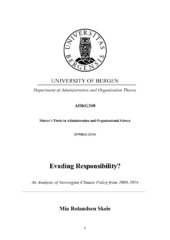| dc.description.abstract | Climate change arguably constitutes one of the greatest challenges of our time, and there are adverse implications associated with the effects of environmental degradation. Additionally, the way these issues are being treated in the international community, also raises some profound ethical issues, such as how near-term costs should be allocated among countries. The idea that the related costs of climate mitigation have developed into a field of its own, in which economists have tried to construct models for calculation of optimal solutions, especially for industrialised countries dependent on the continuation of consuming non-renewable resources, served as motivation for choosing this field. This thesis will take basis in such notions, and assess possible influences on climate policy in a chosen case; namely Norway. The purpose is therefore to examine Norwegian climate policy, with basis in those two Agreements on Climate Policy in 2008 and 2012 settled in parliament. Norway constitutes a special case, often referred to as paradoxical, in that the national economy is extremely dependent on revenues from oil and gas production, while simultaneously stating its intentions to be a leading advocate for construction of international binding climate agreements. The period 2006-2016 is here contended to constitute an important era for Norwegian climate policy creation, in that it was during this time that the Norwegian parliament came to an agreement on two settlements on climate policy, first in 2008 and again in 2012. The method utilised in this thesis will be a qualitative document analysis, based on categorisation of essential empirical findings. This thesis assumes that traditional social economic theoretical approaches and the petroleum sector have constituted stimuli that may have had a reticent effect of the ambition of climate mitigation policy. By investigating documents that provided the foundation for the current strategy, and by utilising two institutional perspectives, the contention was initially that this could provide important insight. | en_US |
